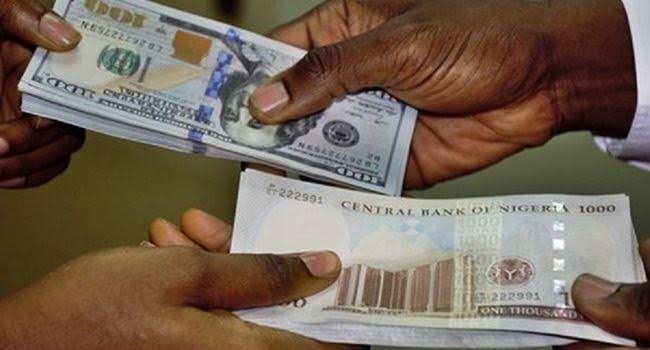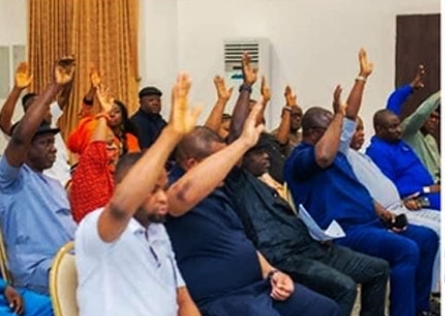
Spiraling insecurity in Nigeria, particularly kidnapping, has forced potential foreign investors to demand for ransom payment bond from Nigerian business owners that seek their partnerships, New National Star reports.
This criminal activity is in three categories which are trending in society. One such category; friends and families kidnap themselves for immediate financial rewards. Another category involves attacking buses on the road and taking all the passengers, assaulting villages and taking helpless victims hostage, and attacking communities. Lastly, this category involves sophisticated organised crime and large-scale business involving multiple actors, often targeting high-value individuals, and designed to draw the government’s attention.
On a daily basis, incidences of kidnapping all around the country are reported. The pattern is that after a few days of the occurrence of kidnap, a demand for ransom follows. Victims of these scourges cut across all segments of society; students, children, women, men and expatriates.
In 2014, this scourge took a whole new dimension, when over 300 female students were kidnapped from the Government Girls Secondary School, Chibok, Borno State by the dreaded Islamic sect Boko Haram. Fast forward to 2021, kidnapping for ransom has not only risen but has also spread to all regions of the country.
Narrating his experience to our correspondent, an Abeokuta, Ogun state based entrepreneur who did not want his name in print said some investors from China he invited to invest in his massive agricultural projects in the state gave him a condition to sign a bond that if any of their expatriates are kidnapped he would pay the ransom.
He said that accepting such condition is akin to signing a blank cheque, as the terms of agreement may be leaked to the public which could spell doom for his business and financial plan. He specifically mentioned the recent ugly incident in Nnewi, Anambra state where four Chinese expatriates were kidnapped at a project site in the city and the local investor was asked by the foreign partners to pay the ransom and rescue their workers.
“If I sign such bond and by omission or commission these guys are kidnapped it is expected that whatever amount of money the kidnappers demand I would pay to guarantee their freedom and safety. It is a difficult condition to meet and I don’t think any sane businessman would want to venture into it,” he bemoaned.
He regretted the negative impact of such retrogressive condition as massive employment which such projects would have created is lost, including foreign exchange earnings through export of the produce.
Another Nigerian, an operator of a Non-Governmental Organization (NGO) whose Conference is scheduled to hold in August, 2024, in one of the South East States, with some foreigners being invited to train and build the capacities of the participants, have been given a condition of ransom payment guarantee in the event of the expatriates being kidnapped.
He told our reporter: “How can I accept to sign such guarantee? It is an event that no one knows how and when it will happen. Imagine, how these foreigner suddenly came up with this condition after handbills have been printed and participants assured of their presence. Anyway, I will find another way round it.”, he stated
He went on to inform our reporter that he was currently sourcing for some expatriates within Nigeria who would execute the deal for him.
In a related development, another successful businessman who has sought the partnership of some investors from Europe shared the same experience. He runs an equipment leasing company and wished to get some foreigners invest in his business but was hampered by kidnapping for ransom payment syndrome.
“The investors are willing and ready. They can weather other harsh economic conditions but they were particular about the safety of their staff with kidnapping ravaging the nooks and crannies of the country! It is so difficult to pull such transaction through under this state of affairs. It is unfortunate,” he told our reporter.
The spate of insecurity in Nigeria has reached such a crescendo where genuine businesses and businessmen are starved of foreign patronage and alliance, with kidnapping on the prowl.
Since 2006, militant groups in Nigeria’s Niger Delta, especially the Movement for the Emancipation of the Niger Delta (MEND), have resorted to taking foreign employees of oil companies hostage as part of the conflict situation in the region. At the last count, more than 200 foreigners have been kidnapped and huge amount of money paid to secure their release.
Also, since the start of the Islamist insurgency in the northern part of the country, kidnapping of expatriates has been on the increase by different militant groups; Ansari, Boko Haram, ISWAP and the rest.
On May 3, 2024, three Indian Nationals were kidnapped on the Lagos/Ibadan expressway with huge sum of money paid before they were released after being held hostage for three days.
Kidnapping of expatriates for ransom has forced some foreign companies in Nigeria to shut down, particularly in the north, with it’s attendant loss of jobs and impoverishment of teeming citizens.
A public opinion poll conducted by NOIPolls in February, 2024, has revealed a higher proportion of adult Nigerians nationwide (56 percent) lamenting that authorities are not doing enough to curb the menace of kidnapping in the country.
The poll further revealed that more respondents (53 percent), about 74,201,877 of the country’s population according to the population and housing census figures of 2006, considered kidnapping to be prevalent in Nigeria adding that the North-Central Zone accounted for the highest number of respondents who decried the prevalence of the menace.
These findings, according to the report, further corroborate the publication of the International Centre for Investigative Reporting (ICIR), that in recent years, Nigeria has seen a sharp increase in kidnapping incidence.
Kidnapping for ransom thrives in Nigeria because the material incentive and opportunity are there, and victims find it expedient to pay a ransom. Bandits, armed groups of Fulani herders and jihadists use forests in different parts of Nigeria as strongholds from which to raid and as safe havens to hold hostages who are released for ransom.
The January 2021 edition of Constellis’ Kidnap for Ransom Insight Report indicated that Nigeria and Libya account for over 70 per cent of cases of kidnapping in Africa.
According to the report, between November and December 2020, Nigeria ranked second in the world behind the USA for the kidnapping of foreign citizens living in the country.
About N653.7 million was paid as ransom in Nigeria between July 2021 and June 2022, a period of one year, for the release of kidnap victims, a report by a Lagos-based security and political risk research firm showed.
The report, ‘The Economics of Nigeria’s Kidnap Industry’, conducted by SBM Intelligence, detailed the country’s security issues, including incidents of banditry and the costs associated with kidnapping for ransom.
The report said at least 500 incidents of kidnapping were recorded and 3,420 people were abducted across Nigeria, with 564 others killed in violence associated with abductions in the one-year period.
The security report also recorded that N6.531bn ($9.9) was demanded in ransom in the year but N653.7m ($1.2 million) was paid as ransom for the release of captives.
In 2023, over 700 abductions were carried out across the country in its first quarter despite the fact that the period was the peak of electioneering and when the presidential election took place, while this year, 2024, a total of 792 abductions were recorded between January – March.
A breakdown of these abductions showed that the North Central suffered the highest with 325 incidents, followed by the North West, 250; South East, 74; North East, 58; South-South, 56; and South West, 29.
In the monitored period, Niger state recorded the highest abductions at 238. This was followed by Kaduna, 113; and Katsina, 86.
Others include Borno State, 47; Zamfara, 40; Edo, 37; Federal Capital Territory, 34; and Imo, 32. Outside of the Northern Region, Imo state recorded the highest for the South East at 32, Edo the highest for the South South at 37 and Osun the highest for the South West with 13 incidents.





